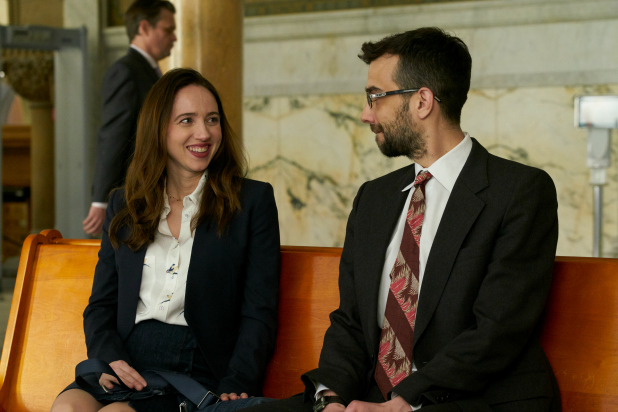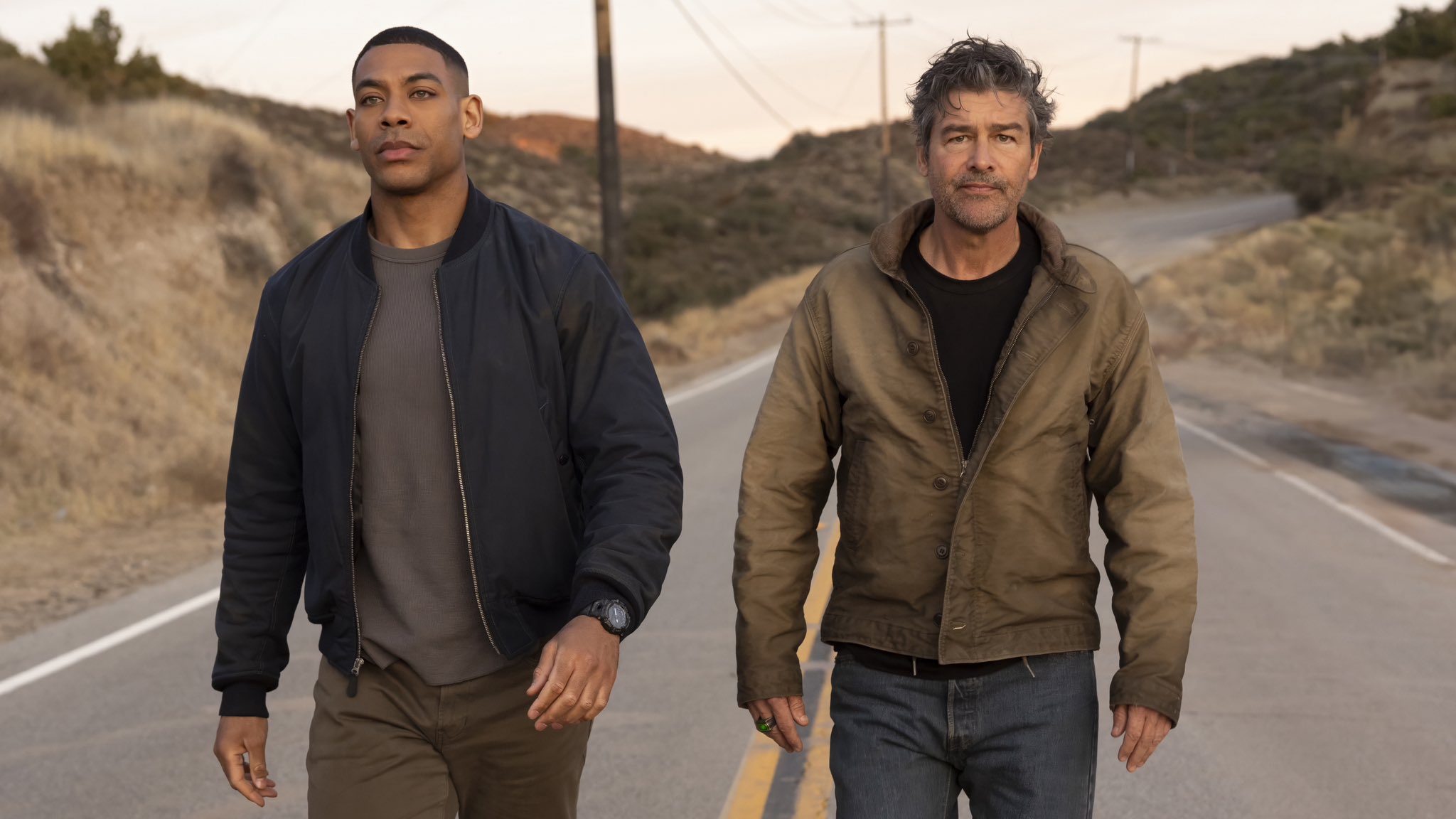
LRM Online recently had a chance to chat with Lone Scherfig, writer and director of the new drama The Kindness of Strangers. In our discussions, we talk about the making of the film and intoxicating nature of kindness.
“In NYC, six strangers’ lives intersect in a modern tale of ordinary people struggling to find help, hope and love. They soon discover that liberation lies in each other’s hands.”
The Kindness of Strangers is out in theaters on and On-Demand!
LRM Online: So we can discuss The Kindness of Strangers. You’re the writer and director. Congratulations. That’s a big load.
Scherfig: And it’s Valentine’s Day today, isn’t it? We don’t celebrate that here, but I’m very happy that the film opens on that day.
LRM Online: Yes, yes. Well, anyways, still, happy Valentine’s Day, even though you don’t celebrate it there, but you’re aware of it. But yes, it is perfect timing, because a lot of times, Valentine’s Day, you focus so much on just the romance part, relationships part, but in reality, you can celebrate even any kindness to anyone, or gesture. Which can mean a lot more.
Scherfig: Oh, that’s good. There was a woman who… It was just at a festival in Sweden, and there was a woman who came up to me after the film, saying, “Thank you for reminding us that kindness is not a commodity.” And that was so nice of her. But for me, it’s almost the other way around, that it is there, and that if you have no one, you have the strangers. That if you’re completely alone with major problems, you might get help from someone you don’t even know. And I think I’ve been surprised, when I’ve been in situations where I really felt low, that hospital staff, or total strangers would sense that you need someone, and you get this unexpected want sometimes. Or give it. I mean, there’s also the joy of being generous, or giving somebody something to somebody else, while noticing if somebody needs you.
LRM Online: It’s like the guardian angel that finds that one person.
Scherfig: I hope it works that way. That some people walk out of the cinemas feeling less lonely, and having more hope than when they walked in.
LRM Online: Yes, because that’s what your film is about. I mean, to me, I got that it’s a film about hope, but at the same time, survival, whatever circumstances you’re in. I mean, in this film, you covered some sensitive topics. Domestic violence, to begin with. Which I really liked how you didn’t have to… it was covered, but you didn’t have to show it physically, because we obviously… no one really wants to watch that. But that it is happening out there, and how much it’s affecting, not only the spouse, but also, the kids.
Scherfig: Yes. It’s everywhere. I mean, once you open your eyes, you see victims in the super market, and in all sorts of, also, different social levels. And it’s either physical abuse or mental abuse, or financial abuse. Or all three of those. And actually, if you analyze what she says, you had all of those, but she doesn’t… little by little, you don’t have a credit card anymore, you didn’t really get an education, you lose your confidence, the cards in his name. You think you need protection from the world, but actually, the world is this scary place, than the home. And I think she’s staying with him, also, because when we do see him, he is quite attractive, and nice, and sorry. So, it is fairly traditional, the way it’s depicted. Also, because that could’ve been a whole film. So, I’m more focused on how she finds a way out of it, than what she comes from.
LRM Online: Yes. I really-
Scherfig: She’s so lovely, Zoe. She also decided… I mean, the character is an optimist. And a little snobby, on behalf of her children. And I think Zoe does that really well. She plays down how much of victim she is, because she had to stay strong for the children. And she had to pretend that it’s not as bad as it actually is.
LRM Online: Yeah, and-
Scherfig: Because you could argue that, how has she let that happen? How could she let… how come she hasn’t seen that the father, also, is violent towards the children?
LRM Online: Right. You also cover, in this case with Clara, this whole other side of homelessness. It’s not just about, “I lost my place,” or, “I’m a drug addict,” or whatever situation, but also the fact that you have it all, but you’re leaving it because you’re trying to protect yourself.
Scherfig: Yeah. I mean, and as Zoe’s mother put it, she’s a fox who has to bite off her paw… who’s trapped, but has to bite off her paw to save her children. So, she’s very heroic, actually. But it’s quite light, the film. And she plays the lightness. And also, she’s quite young to play that part, and it gives it something light, that I really like, that she brought to the film. This sweetness she has, and lightness. And also, Zoe is incredibly smart, so she’s a writer herself, and she’s quite learned in school. And she was pregnant, so that was a different aspect, but you shouldn’t write that.
LRM Online: Oh.
Scherfig: Then you really notice.
LRM Online: Okay, I did not notice at all.
Scherfig: People watch the film without seeing it, but she’s actually five months pregnant, I think, or even more, by the end of the shoot. But don’t write it, because then people will just-
LRM Online: Right. No, no, no.
Scherfig: Go, “What is under those big coats she’s wearing?”
LRM Online: I’m thinking it’s just cold in New York City. That’s what I’m thinking. So, let’s start… As a writer of this film, how did you come to this storyline? What was it that triggered you covering a topic like this? Or story like this?
Scherfig: It’s a combination of love for New York and admiration for the way Americans reach out and then things I was worried about. I mean, living from paycheck to paycheck, the solitude, abused women, a lot… I mean, many elements that are touched upon in the film are primarily this mechanism of people reaching out to strangers because they all end up in this Russian restaurant, for one reason or another.
LRM Online: Right.
Scherfig: So, it has some fairytale quality to it. It’s a little bit how I wish the world was, rather than how it actually is.
LRM Online: Nice.
Scherfig: How the world were, is how you put it. Sorry.
LRM Online: Yeah. It makes sense. I really enjoyed the part where you have Alice being treated at work like, “Well, you don’t have anybody to go to, no one’s waiting for you. You’re single.” That treatment, I could totally relate, because I get that today. And that was just like, “Wow, that is so true. We are treated that way.” Just because you’re single, they anticipate that you can just accommodate everyone else that has the family, the kids, and someone that has someone waiting at home.
Scherfig: Yes. I mean, she does everything for everybody else, and very little for herself. And I think she… because she needs Clara, and because she needs some of the others, that develops some aspect in her, because this happens to her at the same time as she’s being the tower, she’s beginning to tremble. She’s beginning to not be able to do her job anymore because she’s worn out. And so, instead of locking herself up, she opens up a little bit when she sees the children say, “You don’t have anyone to go to.” And when she goes to the hospital to help Clara, so she opens up little by little, and because of it, she finds somebody else. A friend, boyfriend, and a much happier, lighter version of her towards the end, where she is smiling, and in bits, I mean, trying to be a little more charming. But she gives everything. And I think, you see those people everywhere, who really sacrifice themselves. I read about the school teachers in the United States who buy school books with their own money, just because they can’t bear that the books are so bad, and that the children have no pencils. And that all these men and women who work for the state, and who add such important elements of having the country running. And she is one of those.
LRM Online: And then, another thing that I liked about Clara’s character was how she was lecturing her son about, “You have to dress smart to become smart,” something like that. And then, I thought about it. I was like, “That is so true.” Presentation, right?
Scherfig: Yes, but it’s also that she wants him to have the education she never had. Because, of course, it doesn’t make him more intelligent to dress up, but she is vain, and I think she just wants the best for her boys. And I think, you would imagine that soon after this, she can’t help them do their homework anymore. They’ll outgrow her, because now, towards the end of the film, they go explore in New York City, and you feel that is more order in their lives. But she will tell them to do their homework every day, but she won’t be able to help them.
But I think the fact that she can laugh with them, and say… I think she’s a really good mom. And also, I’ve done some research. And the fact that she looks so nice, and the children as well, even if they are homeless, it’s quite common that with women, they will still… I mean, they may still have their nice hair, and nail polish, and hide how miserable they are.
And find second hand clothes at the church. Whereas men, much faster, will look like a cliché of homeless people. And women, also, can spend longer sleeping on other people’s couches. And there’s a bit… the slide down is faster with men than with women. Like you see with Jeff. From one day… With Jeff’s part, from one day to the next, he has nothing except for his yellow toothbrush.

LRM Online: So, I was wondering, what made you wind up with the location? Why New York City?
Scherfig: First of all, I love it very much. But also, I wanted it to be a place where you see the most beautiful, old worldly, luxurious, juxtaposed to the soup kitchens, the worn rooms, the brooms that have had many different functions. This huge organism, which is the best of what many, many people can do when they work together, collaborate, they can build a city like New York. But also, the contrast. Because I wouldn’t want the characters to ever come up with any political statements, but I think it’s fine if the images happen. The huge differences.
And this thing about a Russian restaurant. The fact hat it’s an international world, I like as well. Because I was, of course, asked, “Could it be Paris? Could it be London?” Because it’s a European/Canadian film. Could it have been Toronto? For instance. But I think that New York, the history, those characters, belong there.
LRM Online: And was that really a Russian restaurant? Or is it a hotel? Or what was it? It was a very nice building.
Scherfig: In reality, it’s an architectural… it’s an office for building preservation.
LRM Online: Oh.
Scherfig: It’s not an existing restaurant. I wish.
LRM Online: It looked lovely. Very nice setup. And the piano. Everything looked just perfect.
Scherfig: Where are you from?
LRM Online: I’m in L.A.
Scherfig: Yeah?
LRM Online: Mm-hmm (affirmative).
Scherfig: So, you don’t know New York well enough to know that there is no such street corner in Tribeca, or-
LRM Online: Definitely not. I’ve been to New York, but definitely do not know the streets or so forth. No.
Scherfig: Oh okay.
LRM Online: Yeah. L.A., unfortunately, does not have the pretty buildings, the nice architects. It’s more of the newer-
Scherfig: You do. You do.
LRM Online: Very little. Very little.
Scherfig: It’s just a different period. There’s wonderful architecture in L.A.
LRM Online: To me, I just see, it’s not enough. You have it in downtown, or maybe the small downtown like North Hollywood, but not as much. Not as rich as the east coast has it. That’s for sure.
Scherfig: No, but think, if you look at the old photographs from L.A., then you really understand the idea of it, and the charm of it. I got a lot out of just looking at those picture books, because all of the sudden, I understood what the vision had been, and the different architectural periods that really have their masterpieces.
LRM Online: Maybe I should. Maybe because when you’re in the location, you don’t see it. You don’t see it outside the square. You know?
Scherfig: Wow.
LRM Online: You’re right. You’re right. I should appreciate it a little more. Well, thank you so much for your time in discussing The Kindness of Strangers. I mean, like I said, congratulations. That was a full load, writer/director. And perfect timing, like you said, for a reminder of kindness, that a little can go a very long way.
Scherfig: Oh, thank you. It’s nice to talk to you. And have a good Valentine’s Day.
Don’t forget to share this post on your Facebook wall and with your Twitter followers! Just hit the buttons on the top of this page.
—–
Have you checked out LRM Online’s official podcast feed yet The LRM Online Podcast Network? This includes our flagship podcast Los Fanboys, our premiere podcast Breaking Geek Radio: The Podcast, and our morning show LRMornings. Check it out by listening below. It’s also available on all your favorite podcast apps!
Subscribe on: Apple Podcasts | Spotify | SoundCloud | Stitcher | Google Play

 FOR FANBOYS, BY FANBOYS
Have you checked out LRM Online’s official podcasts and videos on The Genreverse Podcast Network? Available on YouTube and all your favorite podcast apps, This multimedia empire includes The Daily CoG, Breaking Geek Radio: The Podcast, GeekScholars Movie News, Anime-Versal Review Podcast, and our Star Wars dedicated podcast The Cantina. Check it out by listening on all your favorite podcast apps, or watching on YouTube!
Subscribe on: Apple Podcasts | Spotify | SoundCloud | Stitcher | Google Play
FOR FANBOYS, BY FANBOYS
Have you checked out LRM Online’s official podcasts and videos on The Genreverse Podcast Network? Available on YouTube and all your favorite podcast apps, This multimedia empire includes The Daily CoG, Breaking Geek Radio: The Podcast, GeekScholars Movie News, Anime-Versal Review Podcast, and our Star Wars dedicated podcast The Cantina. Check it out by listening on all your favorite podcast apps, or watching on YouTube!
Subscribe on: Apple Podcasts | Spotify | SoundCloud | Stitcher | Google Play



